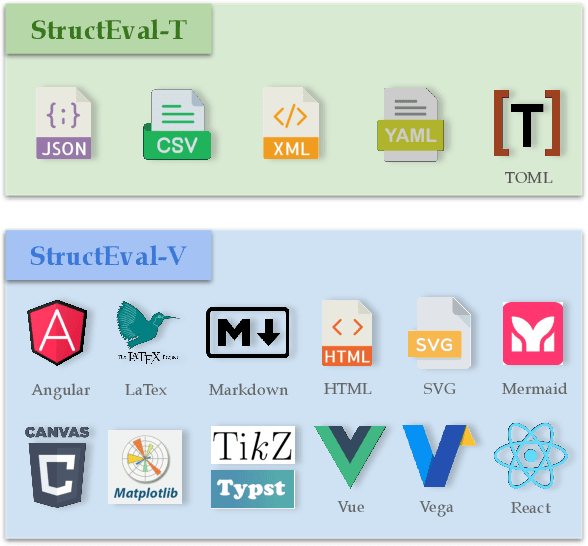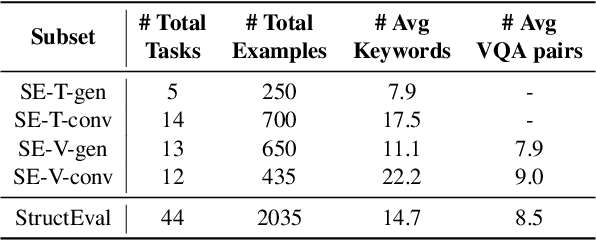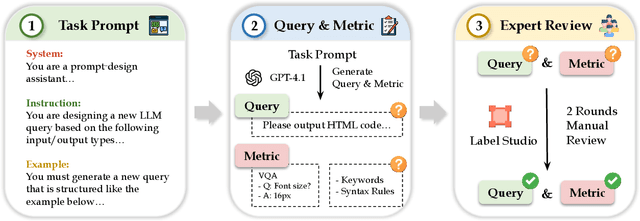Benjamin Schneider
StructEval: Benchmarking LLMs' Capabilities to Generate Structural Outputs
May 26, 2025



Abstract:As Large Language Models (LLMs) become integral to software development workflows, their ability to generate structured outputs has become critically important. We introduce StructEval, a comprehensive benchmark for evaluating LLMs' capabilities in producing both non-renderable (JSON, YAML, CSV) and renderable (HTML, React, SVG) structured formats. Unlike prior benchmarks, StructEval systematically evaluates structural fidelity across diverse formats through two paradigms: 1) generation tasks, producing structured output from natural language prompts, and 2) conversion tasks, translating between structured formats. Our benchmark encompasses 18 formats and 44 types of task, with novel metrics for format adherence and structural correctness. Results reveal significant performance gaps, even state-of-the-art models like o1-mini achieve only 75.58 average score, with open-source alternatives lagging approximately 10 points behind. We find generation tasks more challenging than conversion tasks, and producing correct visual content more difficult than generating text-only structures.
QuickVideo: Real-Time Long Video Understanding with System Algorithm Co-Design
May 22, 2025



Abstract:Long-video understanding has emerged as a crucial capability in real-world applications such as video surveillance, meeting summarization, educational lecture analysis, and sports broadcasting. However, it remains computationally prohibitive for VideoLLMs, primarily due to two bottlenecks: 1) sequential video decoding, the process of converting the raw bit stream to RGB frames can take up to a minute for hour-long video inputs, and 2) costly prefilling of up to several million tokens for LLM inference, resulting in high latency and memory use. To address these challenges, we propose QuickVideo, a system-algorithm co-design that substantially accelerates long-video understanding to support real-time downstream applications. It comprises three key innovations: QuickDecoder, a parallelized CPU-based video decoder that achieves 2-3 times speedup by splitting videos into keyframe-aligned intervals processed concurrently; QuickPrefill, a memory-efficient prefilling method using KV-cache pruning to support more frames with less GPU memory; and an overlapping scheme that overlaps CPU video decoding with GPU inference. Together, these components infernece time reduce by a minute on long video inputs, enabling scalable, high-quality video understanding even on limited hardware. Experiments show that QuickVideo generalizes across durations and sampling rates, making long video processing feasible in practice.
ScholarCopilot: Training Large Language Models for Academic Writing with Accurate Citations
Apr 03, 2025Abstract:Academic writing requires both coherent text generation and precise citation of relevant literature. Although recent Retrieval-Augmented Generation (RAG) systems have significantly improved factual accuracy in general-purpose text generation, their ability to support professional academic writing remains limited. In this work, we introduce ScholarCopilot, a unified framework designed to enhance existing large language models for generating professional academic articles with accurate and contextually relevant citations. ScholarCopilot dynamically determines when to retrieve scholarly references by generating a retrieval token [RET], which is then used to query a citation database. The retrieved references are fed into the model to augment the generation process. We jointly optimize both the generation and citation tasks within a single framework to improve efficiency. Our model is built upon Qwen-2.5-7B and trained on 500K papers from arXiv. It achieves a top-1 retrieval accuracy of 40.1% on our evaluation dataset, outperforming baselines such as E5-Mistral-7B-Instruct (15.0%) and BM25 (9.8%). On a dataset of 1,000 academic writing samples, ScholarCopilot scores 16.2/25 in generation quality -- measured across relevance, coherence, academic rigor, completeness, and innovation -- significantly surpassing all existing models, including much larger ones like the Retrieval-Augmented Qwen2.5-72B-Instruct. Human studies further demonstrate that ScholarCopilot, despite being a 7B model, significantly outperforms ChatGPT, achieving 100% preference in citation quality and over 70% in overall usefulness.
Universal Backdoor Attacks
Nov 30, 2023



Abstract:Web-scraped datasets are vulnerable to data poisoning, which can be used for backdooring deep image classifiers during training. Since training on large datasets is expensive, a model is trained once and re-used many times. Unlike adversarial examples, backdoor attacks often target specific classes rather than any class learned by the model. One might expect that targeting many classes through a naive composition of attacks vastly increases the number of poison samples. We show this is not necessarily true and more efficient, universal data poisoning attacks exist that allow controlling misclassifications from any source class into any target class with a small increase in poison samples. Our idea is to generate triggers with salient characteristics that the model can learn. The triggers we craft exploit a phenomenon we call inter-class poison transferability, where learning a trigger from one class makes the model more vulnerable to learning triggers for other classes. We demonstrate the effectiveness and robustness of our universal backdoor attacks by controlling models with up to 6,000 classes while poisoning only 0.15% of the training dataset.
 Add to Chrome
Add to Chrome Add to Firefox
Add to Firefox Add to Edge
Add to Edge